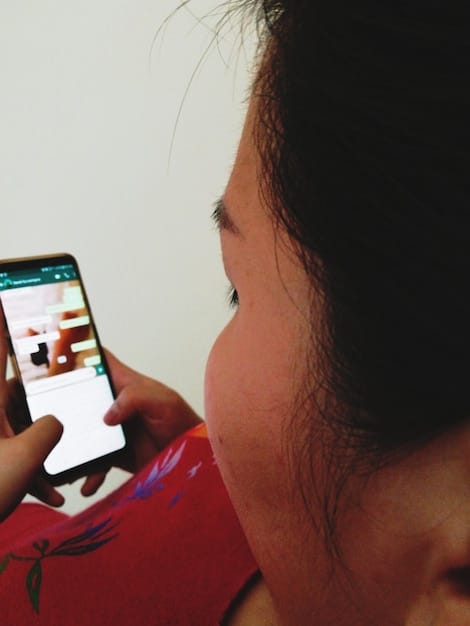Social Media Stress: Is Your Usage Increasing Your Daily Stress by 25%?

Is Your Social Media Use Contributing to a 25% Increase in Your Daily Stress Levels? Yes, excessive social media use can significantly elevate daily stress levels due to factors like constant comparison, fear of missing out (FOMO), cyberbullying, and addiction, impacting mental well-being.
Are you constantly scrolling through social media feeds, only to feel more anxious and stressed? The digital world offers connection, but is your social media use contributing to a 25% increase in your daily stress levels? Let’s explore the potential impacts of social media on your mental well-being and discover strategies to manage your online habits for a healthier, happier life.
Understanding the Link Between Social Media and Stress
Social media has become an integral part of modern life, offering unprecedented opportunities for connection and information sharing. However, beneath the surface of curated content and endless updates lies a potential source of significant stress. Understanding this connection is the first step towards mitigating its negative effects.
The Comparison Trap
One of the primary ways social media contributes to stress is through constant comparison. Users are often bombarded with images and updates showcasing the seemingly perfect lives of others. This can lead to feelings of inadequacy, envy, and low self-esteem.
The curated nature of social media often presents an unrealistic portrayal of reality. People tend to share their highlights, omitting the struggles and challenges they face. This creates a distorted perception of others’ lives, making it difficult to maintain a balanced perspective on one’s own.
Fear of Missing Out (FOMO)
FOMO, the fear of missing out, is another significant stressor fueled by social media. The constant stream of updates about events, gatherings, and experiences can create a sense of anxiety and restlessness. People worry that they are missing out on something important or exciting, leading to a compulsive need to stay connected.
- FOMO can drive excessive social media use, creating a vicious cycle of checking for updates and feeling stressed when perceived to be missing out.
- This anxiety can lead to poor sleep quality, decreased productivity, and increased feelings of loneliness and isolation.
- Recognizing and addressing FOMO is crucial for maintaining mental well-being in the digital age.
- Strategies for managing FOMO include setting boundaries on social media use, practicing mindfulness, and focusing on present-moment experiences.

In conclusion, understanding the link between social media and stress involves recognizing the impact of comparison and FOMO. By being mindful of these factors, individuals can take steps to manage their social media habits and protect their mental well-being.
Identifying the Signs of Social Media-Induced Stress
Recognizing the signs of social media-induced stress is crucial for taking timely action and preventing further negative impacts on your mental health. These signs can manifest in various ways, affecting your emotions, behavior, and overall well-being.
Emotional Symptoms
One of the primary ways social media-induced stress manifests is through emotional symptoms. These can include increased anxiety, irritability, and feelings of sadness or hopelessness. Constant exposure to негативные news, онлайн drama, or curated content can take a toll on your emotional state.
Additionally, individuals may experience feelings of inadequacy or low self-esteem as a result of comparing themselves to others on social media. This can lead to a negative self-image and a decreased sense of self-worth.
Behavioral Changes
Social media-induced stress can also lead to noticeable behavioral changes. These can include spending excessive amounts of time online, neglecting real-life responsibilities, and experiencing difficulty disconnecting from social media.
- Individuals may find themselves constantly checking their phones for updates, even when they know it’s causing them stress.
- This compulsive behavior can interfere with work, school, relationships, and other important aspects of life.
- Additionally, social media use may become a way to avoid dealing with real-life problems or emotions.
- Recognizing these behavioral changes is essential for addressing the underlying stress and developing healthier coping mechanisms.
Physical Manifestations
In some cases, social media-induced stress can manifest physically. This can include symptoms such as headaches, fatigue, and changes in sleep patterns. The constant stimulation and mental exertion associated with social media use can disrupt the body’s natural rhythms and lead to physical discomfort.

In summary, identifying the signs of social media-induced stress involves recognizing emotional symptoms, behavioral changes, and physical manifestations. By being aware of these signs, individuals can take steps to mitigate the negative impacts of social media on their mental health.
Strategies for Managing Social Media Stress
Managing social media stress requires a proactive approach that involves setting boundaries, practicing mindfulness, and cultivating healthier online habits. These strategies can help you regain control over your social media use and protect your mental well-being.
Setting Boundaries
One of the most effective ways to manage social media stress is to set clear boundaries. This involves limiting the amount of time you spend on social media each day, designating specific times for social media use, and avoiding social media before bed.
Using website blockers or app timers can help you enforce these boundaries and prevent yourself from mindlessly scrolling for hours on end. It’s also important to be mindful of the content you consume and unfollow accounts that trigger negative emotions.
Practicing Mindfulness
Mindfulness techniques can be valuable tools for managing social media stress. Before logging on to social media, take a few moments to center yourself and set an intention for your online interactions. This can help you approach social media with a more conscious and intentional mindset.
- While on social media, practice actively observing your thoughts and emotions without judgment. If you notice yourself feeling anxious or stressed, take a step back and disengage from the platform.
- Mindfulness can also involve focusing on the present moment and engaging with social media in a way that is both purposeful and enjoyable.
- Consider using social media as a tool for connection and inspiration, rather than a source of comparison and negativity.
- By practicing mindfulness, you can cultivate a healthier relationship with social media and reduce the impact of stress on your mental well-being.
Cultivating Healthier Online Habits
In addition to setting boundaries and practicing mindfulness, it’s important to cultivate healthier online habits. This involves being selective about the content you consume, engaging in online communities that support your values, and prioritizing real-life connections over virtual interactions.
Consider unfollowing accounts that promote unrealistic standards or contribute to feelings of inadequacy. Instead, seek out content that is inspiring, uplifting, and informative. Engage in online communities that share your interests and provide a sense of belonging.
In conclusion, managing social media stress requires setting boundaries, practicing mindfulness, and cultivating healthier online habits. By implementing these strategies, you can regain control over your social media use and protect your mental well-being.
The Role of Digital Detox in Reducing Stress
A digital detox involves intentionally disconnecting from digital devices and online platforms for a specific period. This practice can be a powerful tool for reducing stress, improving mental clarity, and fostering a healthier relationship with technology.
Benefits of a Digital Detox
There are numerous benefits to incorporating digital detoxes into your routine. One of the most significant is the reduction of stress. By stepping away from the constant stimulation and demands of the digital world, you allow your mind and body to relax and recharge.
Digital detoxes can also improve your focus and concentration. The constant stream of notifications and updates on social media can fragment your attention and make it difficult to concentrate on tasks. By disconnecting, you give yourself the space to focus on what truly matters.
Planning Your Digital Detox
Planning is essential for a successful digital detox. Start by identifying the specific goals you want to achieve during your detox. Do you want to reduce stress, improve your focus, or reconnect with loved ones?
- Next, set a clear timeline for your detox. This could be a weekend, a week, or even a month. The length of your detox will depend on your individual needs and circumstances.
- Prepare for your detox by notifying friends and family that you will be unavailable. Set up an auto-response on your email account to let people know that you will be checking messages less frequently.
- Plan activities to fill the time you would otherwise spend online. This could include reading, spending time in nature, pursuing hobbies, or connecting with loved ones.
- During your detox, resist the urge to check your phone or social media accounts. If you find yourself feeling anxious or restless, engage in a calming activity such as meditation or deep breathing.
Reintegrating Digital Devices
Once your digital detox is complete, it’s important to reintegrate digital devices and online platforms in a mindful and intentional way. Avoid falling back into old habits by setting clear boundaries and practicing healthier online behaviors.
Continue to limit your time on social media, unfollow accounts that trigger negativity, and prioritize real-life connections over virtual interactions. Use technology as a tool for connection and inspiration, rather than a source of stress and distraction.
Seeking Professional Help for Social Media Stress
While self-help strategies can be effective for managing social media stress, there are times when seeking professional help is necessary. If you are struggling to cope with the negative impacts of social media on your mental well-being, reaching out to a therapist or counselor can provide valuable support and guidance.
When to Seek Professional Help
It’s important to recognize when your social media stress is becoming overwhelming and impacting your daily life. If you are experiencing persistent feelings of anxiety, depression, or hopelessness, it’s time to seek professional help. Additionally, if social media use is interfering with your work, school, relationships, or other important aspects of your life, seeking therapy can be beneficial.
A therapist can help you identify the underlying causes of your social media stress and develop coping mechanisms to manage it. They can also provide a safe and supportive space for you to process your emotions and explore healthier ways of relating to technology.
Types of Therapy
There are several types of therapy that can be effective for managing social media stress. Cognitive-behavioral therapy (CBT) is a common approach that focuses on identifying and changing negative thought patterns and behaviors. CBT can help you challenge unrealistic beliefs about social media and develop healthier online habits.
- Mindfulness-based therapy is another approach that can be helpful for managing social media stress. This type of therapy involves learning to observe your thoughts and emotions without judgment, which can help you reduce anxiety and cultivate a more balanced perspective on social media.
- Additionally, interpersonal therapy (IPT) can be beneficial for addressing relationship issues that may be contributing to your social media stress. IPT focuses on improving communication skills and resolving conflicts in relationships, which can help you build stronger connections and reduce feelings of isolation.
- By exploring different types of therapy, you can find an approach that resonates with you and helps you effectively manage your social media stress.
Finding a Therapist
Finding the right therapist is essential for a successful therapeutic experience. Start by asking your primary care physician for a referral. You can also search online directories of therapists and counselors in your area.
When choosing a therapist, consider their qualifications, experience, and areas of expertise. It’s also important to find someone you feel comfortable talking to and who understands your concerns about social media stress.
Building a Healthier Relationship with Social Media
Building a healthier relationship with social media is essential for maintaining your mental well-being in the digital age. This involves cultivating a balanced perspective, practicing gratitude, and focusing on real-life connections.
Cultivating a Balanced Perspective
One of the keys to building a healthier relationship with social media is to cultivate a balanced perspective. Remember that social media is often a highly curated and idealized representation of reality. People tend to share their highlights, omitting the struggles and challenges they face.
Avoid comparing yourself to others on social media. Instead, focus on your own journey and celebrate your own accomplishments. Recognize that everyone is different and that there is no single path to success or happiness.
Practicing Gratitude
Practicing gratitude is another powerful tool for building a healthier relationship with social media. Take time each day to reflect on the things you are grateful for in your life. This can help you shift your focus away from what you lack and towards what you have.
- Consider keeping a gratitude journal where you write down things you are thankful for each day. This can be a tangible reminder of the blessings in your life and help you maintain a more positive outlook.
- You can also express gratitude to others on social media. Share positive messages and comments with friends and followers, and let them know that you appreciate their presence in your life.
- By practicing gratitude, you can cultivate a more positive and fulfilling relationship with social media.
- This shift in perspective can lead to reduced stress, increased happiness, and a greater sense of well-being.
Focusing on Real-Life Connections
In addition to cultivating a balanced perspective and practicing gratitude, it’s important to prioritize real-life connections over virtual interactions. Spend time with loved ones, engage in activities that you enjoy, and build meaningful relationships outside of the digital world.
Remember that social media is a tool for connection, but it should not replace face-to-face interactions. Real-life relationships provide a sense of belonging, support, and love that cannot be replicated online.
| Key Point | Brief Description |
|---|---|
| 📱 Limit Social Media Use | Set time limits to reduce exposure to potential stressors. |
| 🧘 Practice Mindfulness | Be present when online; avoid mindless scrolling. |
| 🚫 Unfollow Negativity | Curate your feed to include only positive and uplifting content. |
| 🗣️ Seek Support | Talk to friends, family, or a therapist about your stress. |
FAQ
▼
Social media often leads to increased stress due to constant comparison with others, fear of missing out (FOMO), cyberbullying, and the addictive nature of these platforms. It can create unrealistic expectations and feelings of inadequacy.
▼
Signs include increased anxiety, irritability, difficulty sleeping, constantly checking your phone, feeling inadequate compared to others, and neglecting real-life responsibilities in favor of social media.
▼
Strategies include setting time limits for social media use, unfollowing accounts that trigger negative emotions, practicing mindfulness, engaging in real-life activities, and having digital detox periods to disconnect and recharge.
▼
Not necessarily. Many people find that reducing and managing their social media use is sufficient. However, some may benefit from a complete break, especially if they have severe anxiety or addiction issues related to social media.
▼
Seek professional help if you experience persistent anxiety, depression, or hopelessness due to social media, or if your social media use interferes with work, school, relationships, or overall quality of life. A therapist can provide guidance.
Conclusion
In conclusion, while social media offers numerous benefits, it’s crucial to be aware of its potential to increase stress levels. By understanding the connection between social media and stress, implementing effective management strategies, and seeking professional help when needed, you can build a healthier relationship with technology and protect your mental well-being.





